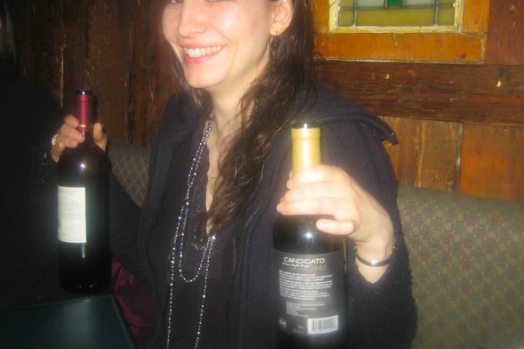This was my kind of adventure out of the house. No driving. No cabs. No Uber.
All we had to do was walk around the fence that divided our backyard from that of our next-door neighbor who was having a party. We could leave anytime without waiting for friends with whom we shared a ride. When we were done, we could be home and in bed in a matter of minutes. Seconds, if we ran. The situation was perfect.
What could possibly go wrong on a summer Saturday night like that?
I promised my wife we wouldn’t stay too late. “Just a couple of beers,” I’d said. “They’re new to the neighborhood, and we don’t want to be rude.” The couple renting the house next to us was younger, and we were the only guests with children in tow. They were eager to get to know us and kept thanking us for bringing our kids along. The rest of the barbeque attendees were fresh out of college, just like our neighbors, and they were drinking like they didn’t have much need to get up on Sunday morning.
I drank beer while my wife sipped her wine. We mingled, ate hamburgers and hotdogs, and tried to keep our kids from splatting mustard stains on their patio furniture. With bellies full and no other children with whom to play, our kids were over the festivities by sundown. They weren’t alone. We had nothing in common with our neighbors and their friends, all nearly two decades younger than us, and my wife was ready to make the trek back to grown-up reality on our side of the fence. There were teeth to be brushed and pajamas to be wriggled into, and we were running out of polite conversation with the next generation.
But I wasn’t done yet. I didn’t care how little I had in common with the other party-goers. I didn’t care that my wife was bored and tired. I didn’t care that our kids were exhausted and restless. I didn’t even care about the promise I made to my wife about sticking to just a couple of beers. I had had enough to drink to know there would never be enough. I was staying at that party until the beer was gone.
My wife and kids made their exit as I awkwardly deviated from the plan and reached into the cooler for another beer. For the next several hours, I tried to follow the conversations of my much younger new friends. We talked about our love of IPAs as that proved to be the only thing we all had in common. I missed all the signals and looks they shot each other basically wondering why the old guy was still in their backyard. As person after person made their way out into the night, I continued to numb any concerns I might have earlier had about fitting in or being a polite guest. I tipped my head back in my neighbor’s lawn chair and felt the carbonation from the beer make me tingle from my toes to my eyelids.
I don’t know when I left, and I’m not really sure why. Did they kick me out? Did I leave with the rest of the straggling serious drinkers? Did we finish the beer, or did they finish with me? Would I owe apologies in the morning, or did I stay just off the shame-o-meter, avoiding the insults and crassness that so often accompanied my overconsumption?
It didn’t really matter why or when I stumbled back around the fence and in my own backdoor. The only thing that mattered was that I tripped up the stairs, or maybe I tripped over a chair. Either way, I lay on the kitchen floor screaming loudly for my wife to come help me. It was the middle of the night, and I was back home with all the grace and dignity my wife had grown to expect from her alcoholic husband.
She rushed to my aid, but not out of concern for me—that emotion had long since left our relationship. Her love for our kids compelled her to my side. She silenced my irrational screams and calls for help, and escorted me into bed with the minimum of commotion. My behavior that night would make a nice addition to the litany of obvious reasons alcohol had overstayed its welcome in my life.
What a perfect example of what it means to be a high-functioning alcoholic. I didn’t set out to become belligerently drunk—it just sort of happened.
I never intended to lie to my wife—I just adjusted plans to enable my addiction.
I didn’t mean to shirk my parental responsibilities—the beer just reorganized my priorities for me.
I didn’t want to drink to blackout—just couldn’t help myself.
The damage I did to family and friends when drinking, well, that was never the idea. I didn’t set out to wreck my life. I had no designs on turning my wife’s love into burning hatred for my very existence.
I didn’t want to live in constant shame from my antics past, or stress from attempts to control my consumption in the future. It all just sort of happened. My love of hoppy, bitter IPAs and strong, throat-burning whiskey on the rocks—they just slowly took over my ability to manage. My life slowly became a tornado, and I never even noticed the chaos.
How could going next door for a couple of beers unravel in both subtle and also spectacular fashion? How could all the appearances of mature order be just a facade for the addiction that boiled below the surface? How could I love my wife and nurture my kids, and still be such a disaster of a husband and father? When and where did it all go so wrong?
The insidious nature of high-functioning alcoholism cannot be overstated. We do what everyone around us is doing. We “work hard and play hard” as the mantra says. We celebrate the successes of adulthood with the beverage of adulthood. We loosen our ties after long, productive days of work, and pour drinks to wash away the stresses of the days. We go to dinners with friends, and share bottles of wine in celebration and as signs of affection for each other. And we stand around charcoal grills and drink beer after beer with the confidence of the generations who have come before us and taught us so well.
But when it is time to stop, when we have had our fill and the drink is no longer serving us, the role models have vanished and we are quite alone on a new journey so unfamiliar and unwanted that death feels like a preferred alternative. Sobriety is as harsh and permanent as it is shameful and impossible. Why? How? When? Where? I can’t believe this happened to me. And now what? That’s it? Am I supposed to accept that the party’s over? Am I expected to live a life so contrary to my training and experience?
Life goes from great (drinker) to bad (alcoholic) to worse (early sobriety) to numb (long-term sobriety) to I wouldn’t have it any other way (permanent sobriety). That’s one of two cycles available to those of us destined to high-functioning alcoholism. The other alternative is quite a bit more eternally sad. Notice that a return to moderate drinking is not one of the options. Alcoholism is a progressive disease, and reversing the damage to settle into wine sipping on social occasions is not a possibility.
When your time is up, when your drinking career is over, it’s just over. You can resist for as long as you like. You can make it worse while you attempt to make it better. But you can’t win until you surrender.
~
If you’d like to learn about how I found permanent sobriety, please read my free e-book, Guide to Early Sobriety.
~











Read 10 comments and reply